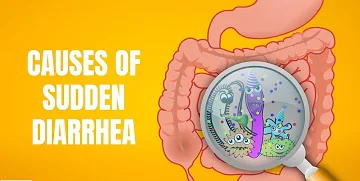How to Stop Diarrhea

Diarrhea is a common condition that many people experience at some point in their lives. It is characterized by frequent and loose bowel movements, often accompanied by abdominal cramps. While most cases of diarrhea are short-lived and resolve independently, it can be uncomfortable and disruptive to daily life.
There are many potential causes of diarrhea, including infections, food poisoning, medications, and underlying medical conditions such as irritable bowel syndrome (IBS). Identifying the underlying cause of diarrhea is important to treat it effectively.
Diarrhea Causes
Diarrhea can be caused by a variety of factors, ranging from infections to underlying medical conditions. One common cause of diarrhea is a viral infection, often called the stomach flu or intestinal flu. These viruses can irritate the gut lining and lead to loose bowel movements.
Food allergies or intolerances can also trigger diarrhea in some people. Certain foods may not agree with your digestive system, leading to intestinal inflammation and diarrhea. In addition, underlying digestive diseases such as Crohn’s disease or ulcerative colitis can cause chronic diarrhea.
Bacterial infections are another common cause of diarrhea. Bacteria such as E. coli or Salmonella can enter the body through contaminated food or water, leading to symptoms of diarrhea. In some cases, parasites or other organisms may also be responsible for causing diarrhea.
Laxative abuse, running, certain cancers, surgery affecting the digestive system, and malabsorption of nutrients can also lead to diarrhea. Additionally, chronic conditions such as irritable bowel syndrome (IBS) can cause recurrent episodes of diarrhea.
Diarrhea symptoms
When experiencing diarrhea, you may notice symptoms such as bloating, thin or loose stools, watery stools, an urgent feeling to have a bowel movement, nausea, and even vomiting. It’s important to pay attention to these signs and take steps to address them promptly.
Serious Symptoms of Diarrhea
If you or your child are experiencing frequent diarrhea, it can be quite an inconvenience. Occasionally, diarrhea will resolve independently within a few hours to a few days. However, if the symptoms persist or worsen, you must make an appointment with your doctor.
Diarrhea can sometimes be a sign of a more serious condition, such as cancer, so it’s crucial to seek medical attention if you notice any concerning symptoms. Some red flags to watch out for include blood or mucus in the stool, unexplained weight loss, or diarrhea that occurs more than thrice daily.
In addition to seeking medical advice, there are several steps you can take at home to help manage and alleviate diarrhea. These include staying hydrated by drinking water, clear broth, or electrolyte solutions. Avoiding foods that may trigger or worsen diarrhea, such as fatty or spicy foods, dairy products, and caffeine, can also help.
When to See a Doctor for Diarrhea
If you or your child are experiencing diarrhea, knowing when to seek medical attention is important. Here are some signs that indicate it’s time to see a doctor:
- – If you notice blood in your stools or have a fever along with diarrhea
- – If you experience severe abdominal pain or belly cramping
- – If your diarrhea doesn’t improve after a few days or is accompanied by nausea and vomiting – If you are unable to keep liquids or fluids down due to diarrhea
- – If you have signs of dehydration such as dark urine, decreased amounts of urine, or dry mouth
- – If your child has diarrhea and is not producing wet diapers or has a rapid heart rate
- – If you experience headaches, confusion, crankiness, or changes in skin color along with diarrhea
These symptoms could indicate a more serious underlying condition, such as an infection, inflammatory bowel disease, pancreatitis, or even colon cancer. It’s important not to ignore these signs and seek medical help promptly.
Remember, diarrhea is a common problem usually managed at home with proper hydration and diet. However, if you notice any concerning symptoms or your diarrhea persists or worsens, don’t hesitate to contact your doctor for further evaluation and treatment.
Diarrhea Diagnosis
If you’re experiencing diarrhea and are unsure of the cause, it’s important to see your doctor for a proper diagnosis. Your doctor will likely start by taking a detailed medical history, including any medications you may be taking that could contribute to the issue.
During the physical exam, your doctor will look for signs of dehydration, belly pain, or other symptoms that may indicate a more serious problem. They may recommend blood tests to check for infections or other diseases, colonoscopy or sigmoidoscopy to examine the colon with a lighted tube and camera, or stool tests to look for bacteria or parasites that could be causing diarrhea.
Sometimes, your doctor may need to take a tissue sample from your colon for further analysis. By conducting these tests and evaluations, your doctor can determine the underlying cause of your diarrhea and develop a treatment plan to address it effectively.
Treatment for Diarrhea
If you’re experiencing diarrhea, several treatment options are available to help you feel better. For mild cases, adults can try over-the-counter medicines like bismuth subsalicylate or loperamide to help reduce the frequency of loose stools. Follow the directions on the package and consult with your doctor if you have any concerns.
In addition to medication, it’s important to stay well-hydrated by drinking plenty of fluids such as water, electrolyte replacement drinks, and clear liquids. Avoid caffeinated beverages like soda and coffee, as they can worsen diarrhea.
Soothing liquids like chicken broth, herbal tea with honey, or sports drinks can help replenish lost fluids and electrolytes. Be mindful of your food choices – opt for bland, easily digestible meals and avoid high-fat or spicy foods that may exacerbate symptoms.
Incorporating probiotics into your diet, whether through supplements or liquid form, can also help restore the balance of good bacteria in your gut and aid digestion. Make sure to eat small, frequent meals throughout the day to avoid overwhelming your digestive system.
Relief From Diarrhea Symptoms
Suppose you’re experiencing discomfort from diarrhea symptoms like itching, burning, or pain in the anal area. In that case, you can do a few things to find relief. First and foremost, make sure to stay well-hydrated by drinking plenty of fluids throughout the day.
Try taking a warm sitz bath to soothe the affected area when using the bathroom. Fill a tub with warm water and sit in it for 15-20 minutes to help alleviate discomfort. Pat the area dry with a soft towel afterward.
Applying a hemorrhoid cream or petroleum jelly to the affected area can relieve itching and burning sensations. Follow the instructions on the product packaging and consult with your doctor if you have any concerns.
When Diarrhea Won’t Go Away
So, what do you do when that pesky diarrhea just won’t go away, even after weeks of dealing with it? It’s important to recognize that chronic diarrhea can be caused by various factors, from certain foods or medications to underlying health conditions. Suppose you’ve been experiencing diarrhea for an extended period. In that case, scheduling an appointment with your doctor to discuss your symptoms and potential causes is crucial.
During your appointment, be prepared to discuss your family history, recent travel, any changes in diet or medication, and specific situations or places where you may have been exposed to potential triggers for diarrhea. Your doctor may recommend further testing, such as stool samples or blood work, to help identify the root cause of your symptoms.
In the meantime, try keeping a food diary to track any patterns or triggers contributing to your chronic diarrhea. Avoiding certain foods, such as dairy or spicy foods, can help alleviate symptoms. Additionally, consider incorporating more fiber-rich foods into your diet to help regulate bowel movements.
Sometimes, your doctor may recommend certain medications or supplements to help manage chronic diarrhea. Maintaining a healthy weight and staying active are also important for overall digestive health. Remember, chronic diarrhea is not something to ignore – seeking medical attention is key to finding relief and improving your quality of life.






